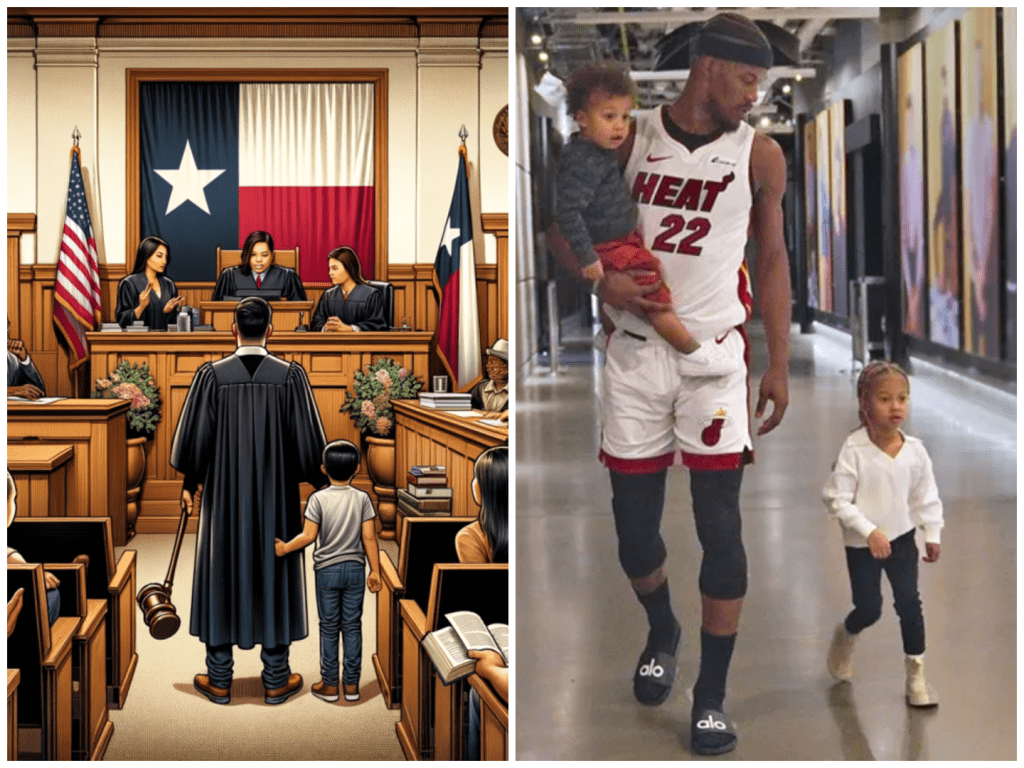Jimmy Butler’s Baby Mama Says $55,000 a Month in Child Support Isn’t Enough — And the Court Battle Shows Just How Complicated Money, Fame, and Parenting Really Are

There’s something uncomfortable about watching someone’s family life get picked apart by the internet, but that’s exactly what’s been happening to Jimmy Butler. In a world where fans worship athletes one minute and scrutinize them the next, Butler has found himself caught in the middle of a private situation made very, very public. Headlines have exploded with claims that $55,000 a month in child support isn’t enough for the mother of his children, Kaitlin Nowak — and she’s reportedly asking for an extra $10,000. For those watching from the outside, it’s easy to react with shock, confusion, or even judgment. But like everything that lives in the gray space between money and parenting, this story isn’t as simple as it seems.

At face value, the numbers are staggering. $55,000 a month. That’s more than many people make in a year, and it’s going toward child support for three kids — a figure already considered by some to be excessive. The idea that an additional $10,000 is now being requested has set social media on fire. People are calling it greed, entitlement, or even abuse of the system. But when you look a little deeper, this case isn’t just about the money. It’s about trust, accountability, parenting standards, and the unique challenges that come when fame and family collide.

Jimmy Butler isn’t a regular guy. He’s a global NBA star, a six-time All-Star, and one of the most recognizable faces in the league. With that comes a different level of financial expectation. The courts aren’t just calculating what it costs to raise a child — they’re trying to mirror the standard of living that child would experience if both parents lived together. And when one parent is a multimillionaire with endorsement deals, private jets, and a luxury lifestyle, the baseline gets raised. That’s how the system works. It’s not a punishment. It’s not about spoiling kids. It’s about equal access to what’s already available to one parent.
Kaitlin Nowak, the mother of Butler’s children, claims that the current support — though large — doesn’t fully cover the care and structure she needs to raise their kids at that standard. The request for an additional $10,000 reportedly stems from nanny costs and household support, which she says are essential given her status as a full-time caregiver. Butler’s legal team, however, has pushed back, arguing that Nowak is unemployed and that some of these expenses may no longer be justified. He’s even filed court documents asking for a detailed accounting of how the money is being used — and is reportedly open to having a guardian ad litem appointed to ensure the children’s needs are being met appropriately.

That’s where the conversation gets tense. On one side, you have a high-profile athlete trying to protect his income and ensure fairness. On the other, you have a mother claiming she needs more to maintain the lifestyle and care her kids deserve. But the internet doesn’t leave room for nuance. It’s either “she’s greedy” or “he’s being cheap.” It’s either “she’s living off his money” or “he’s trying to control everything.” The truth is almost certainly somewhere in the middle. And it’s probably more complicated than either side wants to admit.
What often gets lost in all of this are the children — the very people this money is supposed to support. Whether it’s $55,000 or $65,000 a month, the real question should be: Are the kids being taken care of in a stable, healthy environment? Are their emotional and educational needs being met? Are they growing up with love and support from both parents, regardless of who writes the checks? Those are the questions that matter most. But in a public court fight fueled by tabloids and Twitter threads, those questions are rarely asked out loud.
It’s also worth noting how this kind of case reflects broader issues that athletes — particularly Black athletes — face when it comes to public scrutiny over parenting and finances. There’s a long history of media jumping on stories involving child support, especially when the dollar amounts are high. Suddenly, these athletes stop being admired for their talent and start being dissected like math problems. “How much does he make?” “How many kids does he have?” “How much is too much?” It becomes less about the humanity of the situation and more about judgment — and it rarely feels fair.
Butler, to his credit, hasn’t spoken publicly about the case in any dramatic way. He’s kept it legal, not personal. His motion isn’t about revenge — it’s about transparency. Whether you agree with him or not, it shows a level of care for how his money is being used and how his children are being raised. And it shows how, even when you’re making tens of millions of dollars a year, there’s still a deep vulnerability when it comes to parenting. Money doesn’t buy peace. It doesn’t guarantee trust. It doesn’t erase complicated dynamics between two people trying to co-parent under a microscope.
What makes this story even more important is that it’s not actually unique. A lot of celebrities and athletes go through the same thing — it just doesn’t always make headlines. But the conversations it sparks are valuable. They force us to think about what child support is supposed to accomplish. Is it about survival? Is it about equality of lifestyle? Is it about control? The answer probably changes depending on who you ask. But we rarely ask those questions without a celebrity case to attach them to.
In Butler’s case, the public might never know how the court rules, and maybe that’s for the best. Not every part of a person’s life needs to be broadcasted. But what we can take from this situation is a reminder that parenting under fame comes with a unique set of burdens. And sometimes, even $55,000 a month can’t fix the gaps that money was never meant to fix.
We also have to acknowledge that support, no matter how it’s calculated, is not just about the children. It’s also about the relationship between the adults. And when that relationship breaks down — whether emotionally, logistically, or legally — the support payments become symbols of everything else that’s gone wrong. That’s not fair to the kids, but it’s often reality. The money becomes the battlefield, but it’s rarely the real issue.
At the end of the day, Jimmy Butler isn’t just a basketball player. He’s a father. And Kaitlin Nowak isn’t just “Jimmy Butler’s baby mama.” She’s a parent too. Both of them have responsibilities, both of them have rights, and both of them have challenges that the public will never fully understand. They’re raising children in a world that watches every move they make, and that’s no easy task. The numbers might be large, but the human emotions behind them are the same ones any co-parents deal with — fear, pressure, pride, frustration, hope.
So while social media debates whether $55,000 is “enough,” maybe we should be asking something else: Is this the kind of story we should be judging from afar? Or should we take a step back and let the courts, and the parents involved, do what they believe is best for their kids — without the noise, the assumptions, or the clickbait?
Because no matter who’s right or wrong in this situation, one thing is clear: it’s not easy being a parent. Not in private, and definitely not in public.